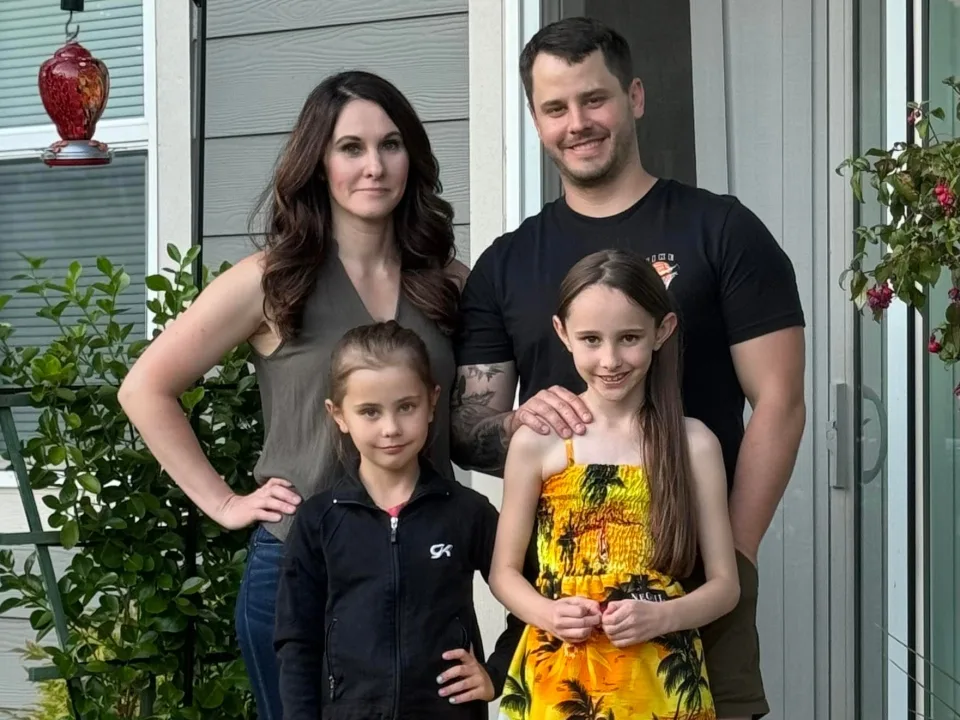Laura Graves and her husband, Samuel, never thought they’d be raising their two children in an apartment, but they say the housing market has left them with little choice.
Over the past three years, the couple, who are both 36 and live in a suburb of Portland, Oregon, have been looking for a home. They want to keep their monthly mortgage payment between $3,000 and $3,500 — or about 30% of their monthly take-home income of about $11,000. Laura is a financial analyst, and Samuel is an electrician, and they each made six figures last year, totaling $250,000.
But rising home prices and mortgage rates in recent years have made this goal difficult to accomplish. Laura says most homes they’re interested in would require a monthly mortgage payment of at least $5,000, or about half of their monthly income. So rather than splurging on a home outside their budget, they’ve decided to wait, pay $2,700 a month for a two-bedroom apartment and a storage unit, and cross their fingers that the market moves in their favor.
“We refuse to become ‘house-poor’ and, like many others, are choosing to sit it out until the housing market is reasonable again,” Laura said. Someone is “house-poor” when they’re struggling financially because their homeownership costs are too high.
Laura and Samuel are among a group of Americans with six-figure incomes who say they can’t find a home they desire that’s in their budget. In recent years, high home prices and elevated mortgage rates have propelled the cost of homeownership in the US to near-record-high unaffordability levels. While the Federal Reserve’s expected interest-rate cuts may lower mortgage rates, they may not do much to help housing affordability in the immediate future. That’s because lower rates could cause buyers to flood the market and push up prices, and a slight reduction in rates may be enough to persuade homeowners with ultralow mortgage rates to sell their homes — keeping the housing supply lower and home prices higher.
To be sure, the average 30-year fixed mortgage rate recently fell to its lowest level in more than a year, but it’s still considerably higher than it was in 2021 and 2022.
Laura and Samuel shared whether they’ve considered moving for cheaper housing and how they’re trying to save for a home.
There’s not enough money for a home, retirement, and childcare
Homes don’t come cheap in the Portland area. According to Zillow, the average home value in Portland is $541,000, and in Wilsonville, the Portland suburb where the couple resides, it’s $642,000. A SmartAsset analysis of home sale prices published in June found that Portland was the 15th-most-expensive housing market in the country.
Laura pointed to one home in Wilsonville they were interested in that was listed for $635,000. With an 11% down payment, they estimated their monthly mortgage payment would be about $5,000 — about 43% of the couple’s take-home monthly pay.
The couple knows that other areas of the US may have more affordable housing, but they’re not sure they’d want to move again.
The couple lived in Portland for six years before moving to their hometown of Spokane, Washington in 2018. Housing was more affordable — Laura said they bought a home with a monthly mortgage payment of $2,200 — but she and Samuel found themselves missing their work back in Portland.
In 2021, after Laura’s old supervisor offered to double her pay if she returned to her old job, the couple decided to sell their home and move back to Portland.
“We actually tried uprooting the kids to a more affordable town and found ourselves less happy in the end,” Laura said.
When they first moved back and began looking for homes, Laura said, they were a “little picky” because they didn’t want to overpay for a home they didn’t love. They weren’t rewarded for their patience — home prices and mortgages continued to tick up.
To save for a home, Laura says, she and Samuel aren’t saving as much for retirement as they’d like to. Ideally, they’d be putting 15% of their annual income toward retirement — some experts recommend this — but Laura says they’ve only been able to set aside roughly 3%.
The couple has also opted for the part-time summer-camp option for their two children, who are 7 and 9 years old. Laura says sending her kids to their camp full-time would have collectively cost about $5,000 a month. When they’re not at camp, she says, the kids stay home with her while she works remotely.
Going forward, Laura says they plan to continue monitoring the housing market for a home they like that’s in their budget. While they’re trying to remain patient, she says, they’re not optimistic that home prices or mortgage rates will drop considerably anytime soon.
“Our children have begun talking about how they want a house so badly and their own rooms,” she said. “We’ll never get these years back. By the time we buy, we won’t even need room for a play set.”
Read the original article on Business Insider
Last modified: October 19, 2024




